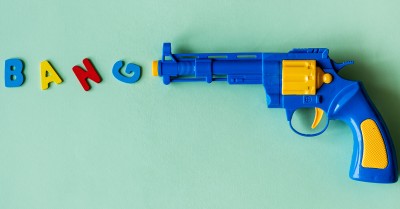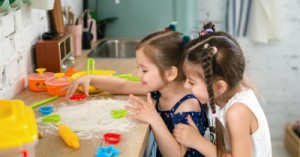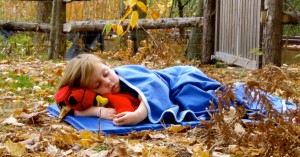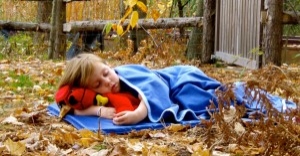Symbolic or dramatic play is one of the key play phases outlined by developmental psychologists. Part of such pretend play may involve weapons, just like other objects children see in popular media and tv. The following article provides information on Does Weapon Play Encourage Violence, the Benefits Of Weapon Play and more.
Does Weapon Play Encourage Violence?
The chief objection to weapon play is that it may encourage the potential for violent behaviour in children. Since they rarely, if ever, see guns in their surrounding world and almost only in popular media, in their minds, weapons come to be associated with aggression and bloodshed. It is because of this association with violence that many families and educators are wary of allowing guns and other weapons in pretend play.
When children engage in such play with weapons, the primary imitative actions are of killing, fighting, and being killed accompanied by equally violent sounds like the rat-tat of machine guns, the loud boom of bombs or the clanging of swords.
Driven by such concerns, many early childcare centres have taken steps to discourage pretend play with weapons. In fact, according to a media report 79 per cent of early childhood services no longer allow toy weapons, driven by concerns that toy guns and swords ‘encourage aggression and create a noisy, chaotic environment'
Benefits Of Weapon Play
Even children as young as two years can distinguish between what is real and what is make-believe… It is not necessary to stop a child's play when a child knows that what they are doing is playing; it's not a real situation and no one is getting hurt.' According to My Early Childhood Education (New Zealand), weapon play can benefit children by:
- Exercising their imagination
- Honing their problem-solving skills
- Empowering them to take the initiative and make decisions
- Teaching empathy
- Teaching them about consent and safety when playing games, e.g. only 'shooting' others who agree to play the game
- Allowing them to share interests and build friendships
- Developing confidence
- Developing play-acting and language skills
- Teaching them limits, e.g. if they're too rough, then the game will stop
- Teaching them how to cooperate
Pretend Play Is Just That – Pretence
Many psychologists and educators however hold a more optimistic view of the matter. They believe that through pretend play involves the symbolic use of objects, children are inherently aware that the stick is not a sword or that the wooden block is not a gun. So if you find your little learners mock-fighting with sticks or running around making booming noises, it is not essential to intervene and stop such play.
Just keep an eye so that there is no rapid escalation of aggressive behaviour and no one gets hurt. Also, teach them consent so that they ‘shoot’ or ‘fight’ with only those children who are keen on this sort of play.
Yet another way to keep pretend play healthy is to discourage play with authentic-looking weapons like replica toy guns. Instead, make it fun to play with commonly found objects in nature like twigs and tree branches or loose parts like cardboard boxes and foam pool noodles besides providing positive reinforcement for imaginative use of such material.
The other advantage of not interfering with pretend play with weapons is that children need the space to process their thoughts and ideas if they are to make sense of the real world. They are likely to do this during mock gunfights or acting like their favourite Avenger. Eventually, they are likely to move on to other actions and roles as their teeming brain explores more of their surrounding world.
Children engage in pretend play, initially imitating real-world actions into self-created settings and then creating complex narratives with distinct roles, and sequences that include others.
Further Reading
Benefits Of Home Corner - The following article provides suggested learning objectives that support a child's overall development.
How Pretend Play Supports Children's Learning - Here are a few more ways that pretend play can be a powerful aid to the overall growth of children.
Importance of Play In Early Childhood - The following article provides information on the therapeutic powers of pretend play.
Reference:
Is Gun Play A Good Or Bad Thing For Children, Care For Kids







 In Norway and most other Scandinavian countries, children nap in the outdoors. According, to research outdoor sleeping not only promotes better daytime sleeping, but it
In Norway and most other Scandinavian countries, children nap in the outdoors. According, to research outdoor sleeping not only promotes better daytime sleeping, but it Feel Good Feb is dedicated to saying thanks, expressing gratitude, and promoting good deeds and random acts of kindness.
Feel Good Feb is dedicated to saying thanks, expressing gratitude, and promoting good deeds and random acts of kindness.
 Here’s a comprehensive Mobile Phone and Smart Watch Policy tailored for early childhood education and care (ECEC) services in Australia, aligned with the latest 2025
Here’s a comprehensive Mobile Phone and Smart Watch Policy tailored for early childhood education and care (ECEC) services in Australia, aligned with the latest 2025 Across the early childhood education and care sector, educators are sounding the alarm: current staffing ratios are insufficient to deliver safe, meaningful, and developmentally appropriate
Across the early childhood education and care sector, educators are sounding the alarm: current staffing ratios are insufficient to deliver safe, meaningful, and developmentally appropriate Thanks to the new National Model Code and upcoming regulatory changes under the National Quality Framework (NQF), early childhood services across Australia must now implement
Thanks to the new National Model Code and upcoming regulatory changes under the National Quality Framework (NQF), early childhood services across Australia must now implement In the quiet hum of a weekday morning, something felt off. Preschool doors opened, but classrooms remained silent. No greetings. No redirection. No educators. And
In the quiet hum of a weekday morning, something felt off. Preschool doors opened, but classrooms remained silent. No greetings. No redirection. No educators. And A: In early childhood education and care (ECEC) settings across Australia, mobile phone use by educators is now subject to strict national reforms aimed at
A: In early childhood education and care (ECEC) settings across Australia, mobile phone use by educators is now subject to strict national reforms aimed at The end of the year is a busy and emotional time in early childhood services. Many services close for a short period over Christmas, and
The end of the year is a busy and emotional time in early childhood services. Many services close for a short period over Christmas, and In early childhood education and care, child safety is not just a number—it’s a practice. While educator-to-child ratios are essential, they are only one part
In early childhood education and care, child safety is not just a number—it’s a practice. While educator-to-child ratios are essential, they are only one part Being an educator is both rewarding and demanding. Between planning, documentation, room management, and supporting children’s wellbeing, the workload can feel overwhelming. That’s why practical
Being an educator is both rewarding and demanding. Between planning, documentation, room management, and supporting children’s wellbeing, the workload can feel overwhelming. That’s why practical


